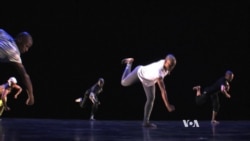“I’m a bit scared. We have performed [this] in Europe before, but this is a different audience, a different continent,” said Luyanda Sidiya, artistic director of the Johannesburg-based Vuyani Dance Theatre, speaking just hours before the New York premiere of “Umnikelo,” a dance he created for eight men and women.
“Umnikelo,” Sidiya said, is about making an offering. “It’s basically giving thanks, it’s appreciating what you have as an individual and offering yourself to the moment that you live in, the talent that you have, and giving thanks to the deity, the most high power.”
Now in its 15th year, Vuyani is often described as a blending of African rhythms and dance with Western modern dance. But as Sidiya points out, there is no single African style of dance. There are hundreds.
“Which one is African dance? From Egypt, from South Africa, from Zimbabwe? These [are] different tribes; different cultures within Africa. And at the same time, I cannot be boxed in as an African choreographer,” he says. “I’m a choreographer that does work globally, hence the work is a fusion of different elements.”
Sidiya, whose father was Xhosa and mother Zulu, said Vuyani itself includes dancers from six or seven different tribes, and that “Umnikelo” comments on this.
“It’s a fusion of different tribes, and how do they live in harmony, and how do they find the commonality and the ground that would say, 'this is how we are special and this is what we can do as different cultures, different tribes,'” he said.
He needn’t have worried about the City Center audience's response. The audience appeared riveted by the whirling, stamping dancers, who wore glimmering, unisex costumes that looked both classical and futuristic. They were accompanied by several musicians, drumming, playing the violin and singing.
Vuyani was invited to perform at New York's City Center as part of its Fall for Dance Festival, and as part of “Ubuntu,” a three-week festival of South African arts organized by Carnegie Hall.
Other artists in “Ubuntu,” which runs through November 5, include singer Angélique Kidjo, jazz pianist and composer Abdullah Ibrahim and visual artist William Kentridge, among many others.





